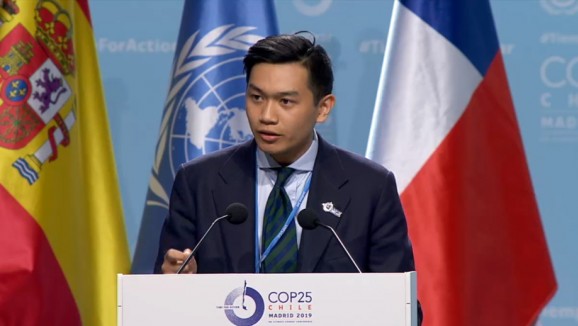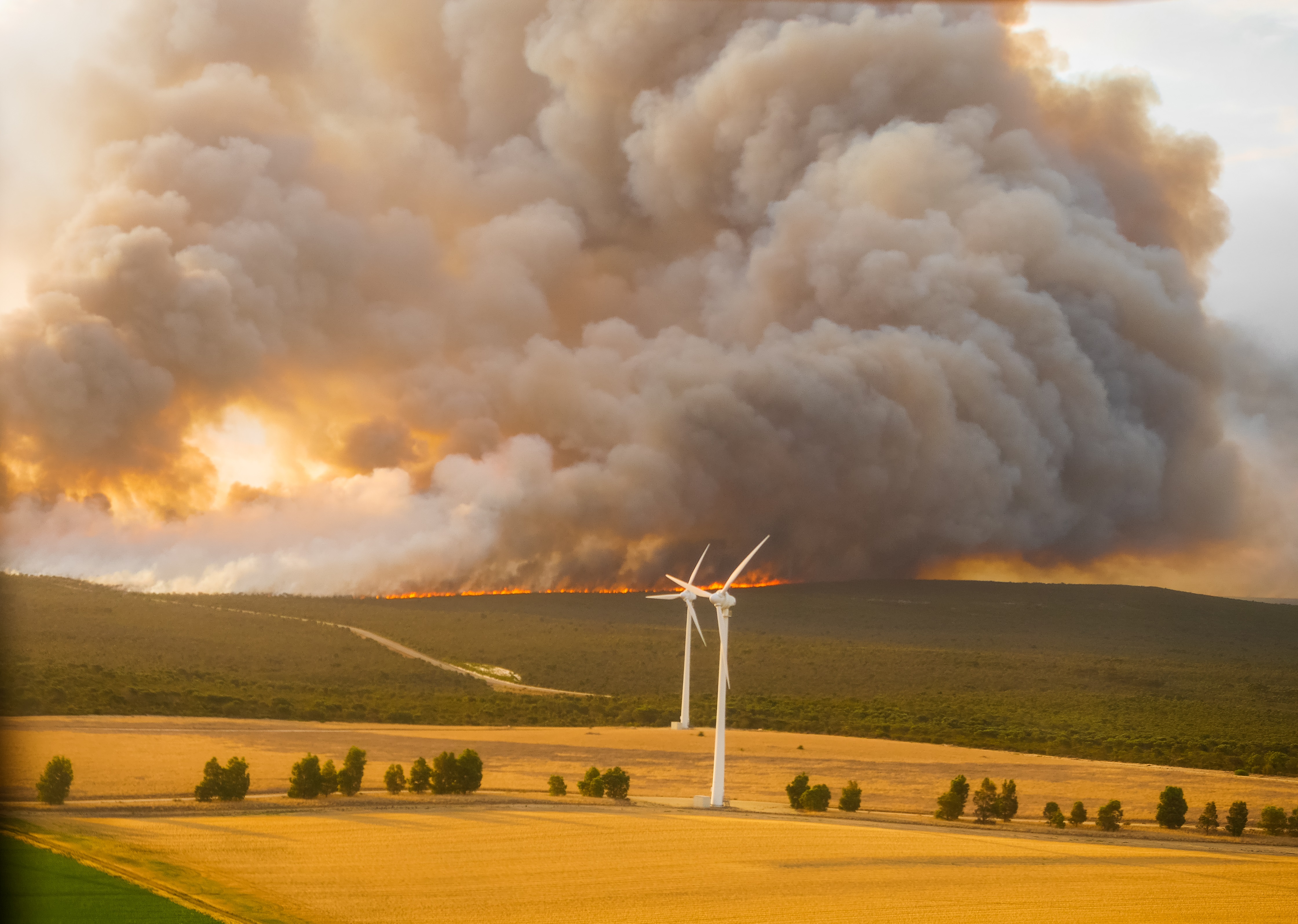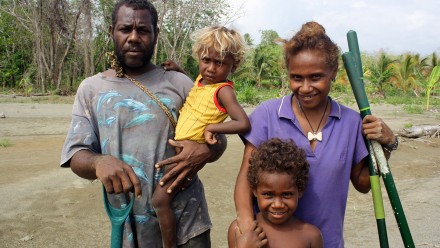2019 ANU Climate Annual Report
Message from the Director
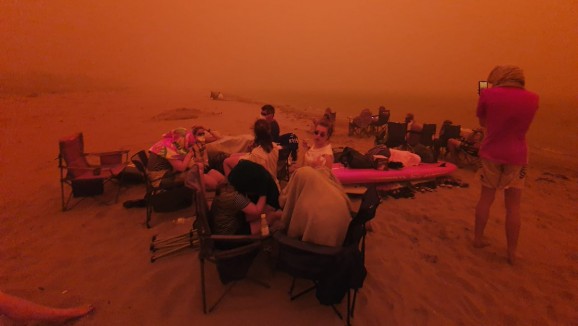
People evacuating from bushfires at Batemans Bay on New Year's Eve, 2019. Credit: Kirsty Blake
“Evidence of climate change has become increasingly hard to ignore throughout Australia. 2019 was by far the hottest year on record (1.52oC above the 1961-1990 baseline), with the hottest summer (2.14oC above), hottest December (3.21oC above) and the hottest day (41.9oC) to name just a few of the records broken. We have just experienced extraordinary and unprecedented fires all over the country with tragic consequences.
But it’s not just our summers that are becoming harsher – spring 2019 was Australia’s driest ever, much of Australia is in the grip of a devastating drought and problematic fires are occurring throughout the year and in parts of the country that haven’t previously experienced these conditions. Australians are increasingly recognising the danger that climate change poses. Climate change was ranked at the top of a list of ten possible threats to Australia’s vital interests for the first time ever with 64% of Australians seeing it as ‘a critical threat’.”
Research highlights
The CCI brings together cutting edge climate research – from fundamental climate science and its effects on our biophysical environment, to societal, economic, political, legal and technological impacts and responses.
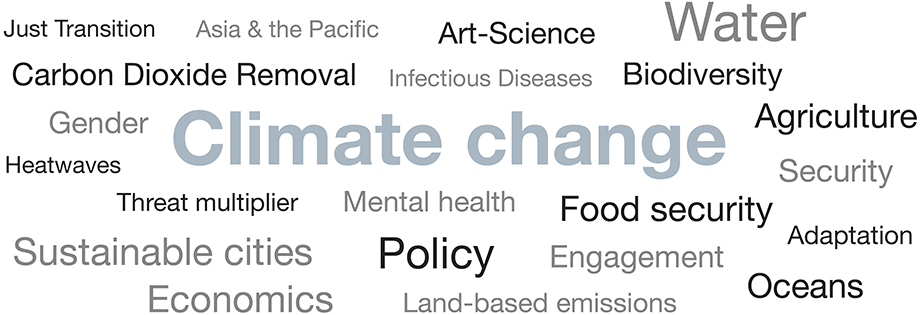
Here are some highlights (far from comprehensive) that demonstrate the breadth of climate change research by CCI members in 2019.
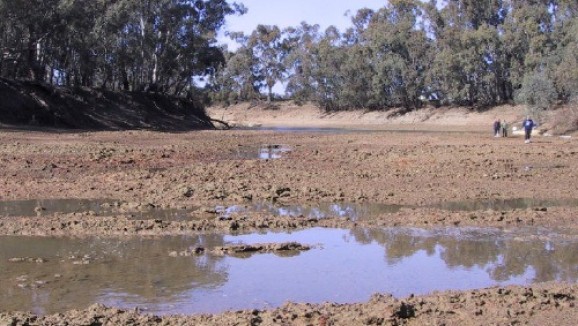
Why we’re in a water emergency and what we can do about it »
In October 2019, leading ANU water economist, Professor Quentin Grafton, called on the government to declare a water emergency to focus attention on Australia’s dire water situation.
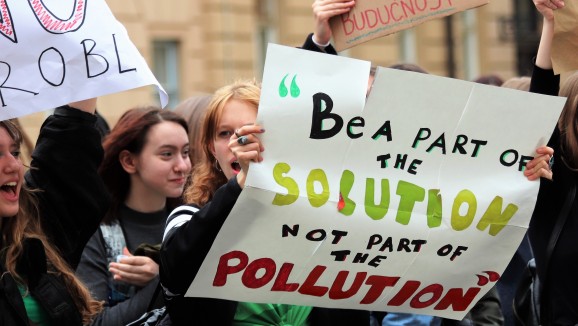
What’s driving youth participation in the school climate strikes? »
In September 2019, hundreds of thousands of school students and their families rallied across Australia. Hannah Feldman is fascinated by the convergence of factors that are driving the movement.
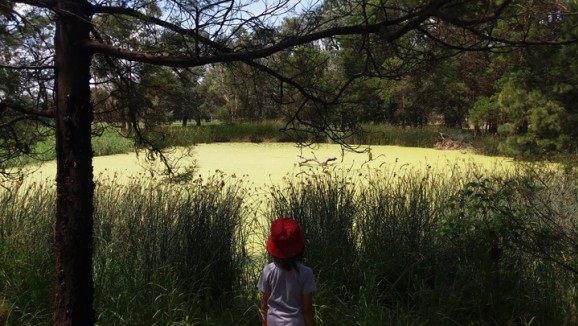
Exploring the impacts of a changing climate on public health? »
Growing up in India in the 1980s, Dr Aparna Lal had access to running water for only two hours a day, and it wasn’t always clean. At the time she didn’t even question this, until she moved to New Zealand and suddenly clean drinking water was on tap 24 hours a day.
How can we have better conversations about solving climate change? »
As a new area of climate action emerges in the form of carbon dioxide removal, what can we learn from this conflicted space? Dr Bec Colvin from the Crawford School of Public Policy has been exploring this question.
Education spotlight
Studying climate change at ANU
As the impacts of climate change become increasingly apparent, people who understand its multiple dimensions and can contribute to developing, communicating and implementing innovative solutions are in increasingly high demand.
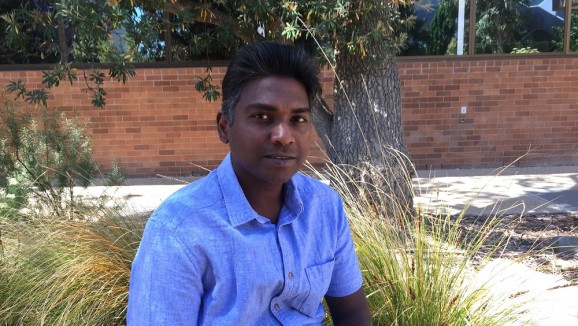
Master of Climate Change profile - Chinthaka Jayasooriya
Chinthaka Jayasooriya, believes there’s already relatively good understanding of how climate change will affect his country, but that what’s lacking is the skills to apply that knowledge to develop policy and management solutions.
For me, the Master of Climate Change is all about policy application. When I get back home, I’ll be well placed to develop solutions and apply them. I’m getting real world experience, which will give me a much better career path when I return to Sri Lanka.
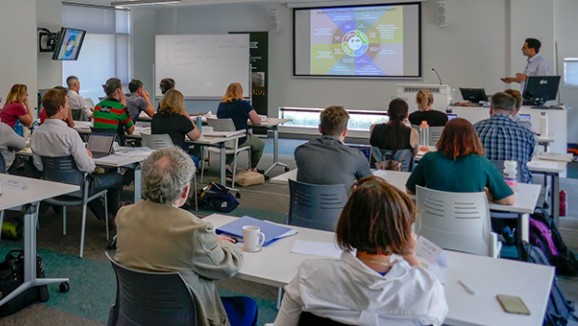
Climate Essentials one-day professional short courses
Probably the best short course I have attended to date. Great work.
All the presenters were at the top of their game, highly professional and the topics fully engaging.
The range of speakers and different parts of the talks provided good insight into how to build this into my work in policy and stakeholder engagement.
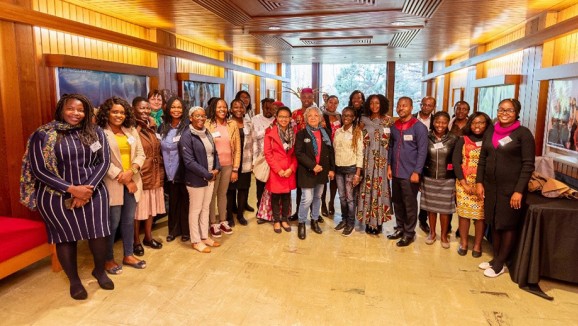
Climate Change Adaptation short course for professionals from Africa
25 attendees were selected from over 900 professional applicants from Sub-Saharan Africa.
The opportunity to be at ANU opened me up to a world of advanced concepts, skills and technologies from leaders in climate change and birthed professional networks that have motivated me to be an agent of change.
Public policy engagement & outreach
The Climate Change Institute is engaged with policymakers at an international, national and state / territory level on an ongoing basis. Here are a couple of examples:
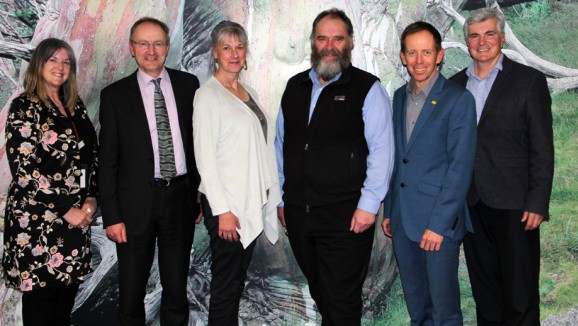
Three CCI members are members of the ACT Climate Change Council, which plays a key role in advising the ACT Minister for Climate Change and Sustainability on climate related issues. From left: Karen Jesson, Paul Bannister, Professor Penny Sackett (Chair), Associate Professor Cris Brack, Shane Rattenbury MLA, Professor Mark Howden.
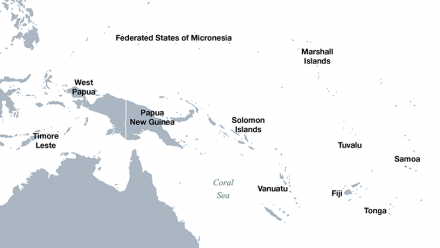
Policy engagement in the Pacific »
CCI members are engaged with policymakers across the entire Pacific region on a range of climate related issues, including water governance, risk management, sustainable urban development, climate adaptation, disaster response, food security, displacement and resettlement.
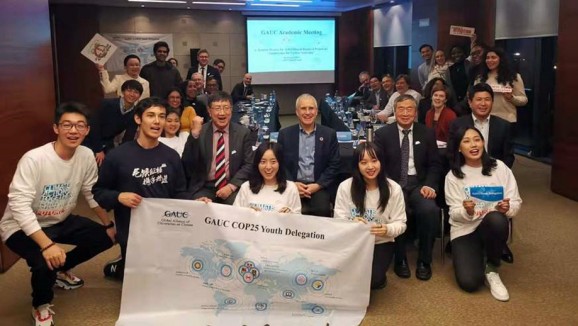
Global Alliance of Universities on Climate (GAUC) »
GAUC has been designed to facilitate greater levels of collaboration on climate issues, greater engagement with climate stakeholders and the promotion of environmental practices by universities in line with UN climate conventions and Sustainable Development Goals.
ANU contributions to the Intergovernmental Panel on Climate Change (IPCC)
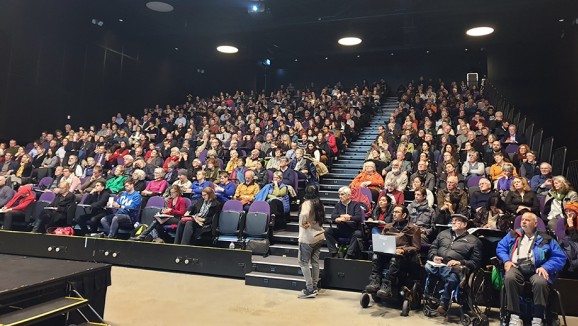
IPCC Special Report on Climate Change and Land
Unprecedented land exploitation is contributing to climate change, whilst at the same time land potentially offers solutions to reducing greenhouse gas emissions, including reforestation and storing carbon in soil.
Given the stark warnings outlined in this report, it’s vital that the findings are integrated into policy and management decisions urgently – we have no time to lose.
– Professor Mark Howden, IPCC Vice Chair
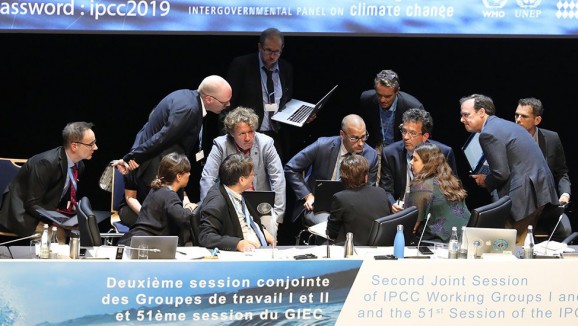
IPCC Special Report on the Ocean and Frozen Regions in a Changing Climate
Earth’s oceans and ice are under threat from climate change, but there’s still time to avoid the worst scenarios if we act urgently.
Australia’s coastal cities and communities can expect to experience what was previously a once-in-a-century extreme coastal flooding event at least once every year by the middle of this century – in many cases much more frequently.
– Professor Nerilie Abram,
Coordinating Lead Author of the report
Building a community of climate researchers and teachers
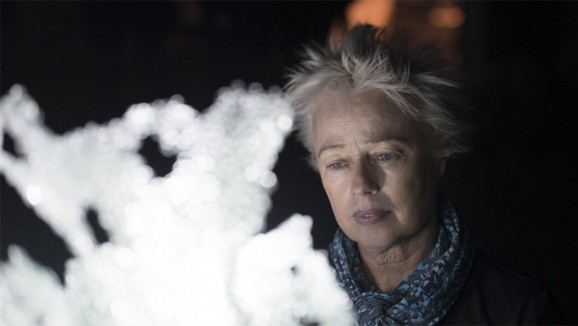
Member profile – Ngaio Fitzpatrick
Ngaio Fitzpatrick is an artist and Visiting Fellow with the ANU Climate Change Institute.
“Working with the CCI, I’ve been inspired to communicate the urgency of climate change and the need to act using my work and that of other artists. Art can connect the viewer to science and environmental issues in ways that research reports, graphs and data do not. It can also offer different experiences that may stay with the viewer for an extended period of time.”
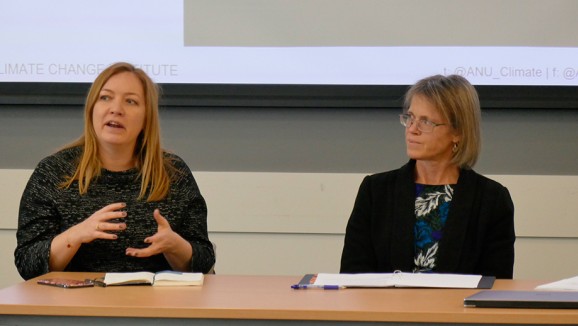
CCI Advisory Committee welcomes four new members representing government, business and NGO sectors
In 2019, the CCI Advisory Committee was expanded to include representation from government, business and NGOs. Jo Evans (Department of the Environment and Energy) and Emma Herd (Investor Group on Climate Change) spoke at a seminar for CCI members outlining government and the investment industry’s priorities for climate research.
ANU climate events
What people said:
A well-run informative event of great political, social and topical value. Well done.
These events are always informative, useful and very important. Lately I've been bringing someone who needs convincing and is slowly coming round. Our discussions afterward are animated and these sessions really help!
Very clear and erudite summary of a large, complex report, presenting thoroughly researched and peer-reviewed facts in a straightforward, unexaggerated manner.
Here are some examples showing the diversity of our 2019 events.
An overview of how our climate is changing and how we’re responding to those changes, including discussion of the economic benefits of climate action.
Food generates a lot of greenhouse gas emissions. How do we motivate people to make low-carbon choices that suits them? With writer Jo Clay.
This symposium explored the role and impact of gender on climate change adaptation using presentations, performances, video, art and Q&A.
In the media
The media is a vital channel for communicating ANU climate research to the broader community. Climate researchers across ANU engage with media on a daily basis. In 2019:
Here are some examples of 2019 media coverage:
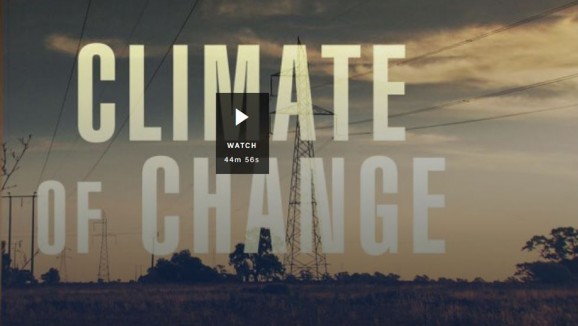
Four Corners: Climate of Change »
Featuring Professor John Hewson and Professor Frank Jotzo
ABC TV, 1 April 2019
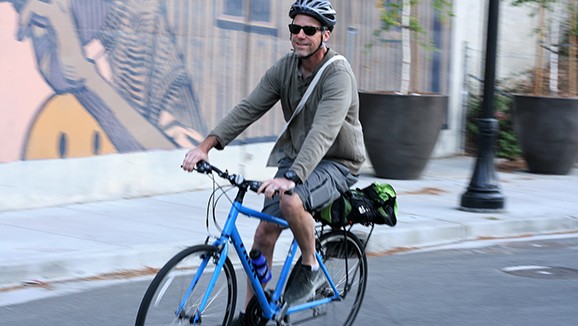
Action on climate change, one person at a time »
Dr Arnagretta Hunter
The Canberra Times, 24 July 2019
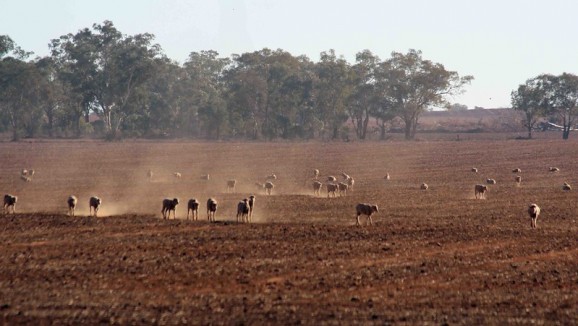
NASA satellite data reveals depths of Australia’s drought »
Featuring Dr Paul Tregoning and Rebecca McGirr
The Australian, 14 June 2019
Photo: Ian Sanderson, Flickr
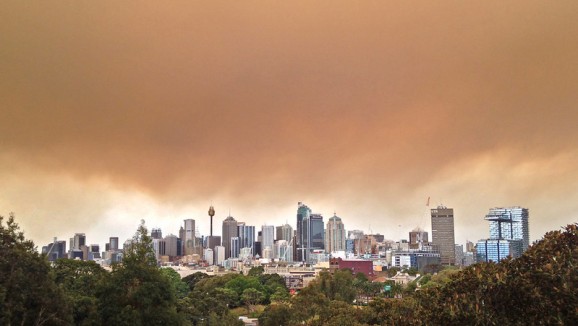
Smoke haze has long-term health impacts, experts warn »
Professor Sotiris Vardoulakis
Daily Telegraph, 16 December 2019
Keep in touch
If you’d like to get involved in ANU climate change activities, subscribe to our newsletter and follow us on social media.
Updated: 13 April 2023/Responsible Officer: College of Science/Page Contact: https://iceds.anu.edu.au/contact








